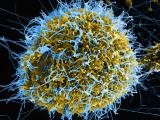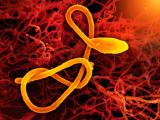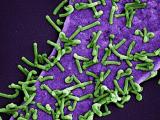Liberia's health ministry and the World Health Organization (WHO) today announced they have confirmed three new Ebola cases, involving a 15-year-old boy from Monrovia and family members.
At a media briefing today, Bruce Aylward, MD, MPH, the WHO's assistant director-general in charge of Ebola outbreak response, said the boy's symptoms began Nov 14, that he was hospitalized Nov 17, and that his Ebola infection was confirmed yesterday. In a statement today, Liberia's Ministry of Health and Social Welfare (MOHSW) said it has confirmed three cases, the first a patient who presented at a hospital in Monrovia with fever, weakness, and bleeding.
The two other cases include the boy's 8-year-old brother and his father, the New York Times reported today.
Viral persistence in survivor?
The MOHSW said four patients and high-risk contacts are in care at an Ebola treatment center in Monrovia. According to the Times report, at least seven healthcare workers may have had contact with the boy at John F. Kennedy Medical Center in Monrovia before his illness was detected and while not wearing adequate protective gear.
The MOHSW said it is decontaminating the unit and that all healthcare workers who were in contact with the boy have been notified.
Aylward said the investigation is still under way, but the infection is likely related to a reintroduction from persistent virus in a survivor. He said additional illnesses are suspected in two of the boy's siblings, who have been unwell over the past few days, and added that the boy's father and mother had transient illness over the past few weeks, triggering questions about whether they were sick with Ebola.
The boy had no known contact with a survivor or other known risk factors such as travel or funeral attendance, he added. Detailed genetic tests would reveal more clues about the source of the child's virus.
The chance that the boy's illness is part of missed transmission chain is unlikely, given the span of time that has passed since the country's last case was detected, Aylward said. He noted that Liberia was 78 days into its 90-day enhanced surveillance period after it was declared free of the virus for a second time on Sep 3.
Risk-management phase of outbreak
Detection of new Ebola cases in Liberia underscores the importance of one of the two main objectives of the third phase of the response that's currently ongoing in the outbreak region, Aylward noted: Manage the risk and build on new information about viral persistence in survivors.
So far there have been seven events in which health officials can't rule out the possibility of a flare of disease from a survivor, Aylward said, adding that all involved from one to eight cases and no more than two to three generations of transmission.
Based on what's known about virus persistence in survivors so far, health officials expect that the virus will eventually die out in the convalescent population, likely by the end of 2016. Aylward characterized the threat of flares like the current one in Liberia as inevitable, but rare.
All three of the countries have taken aggressive steps to quickly detect and respond to new cases, and the Liberia example shows the importance of maintaining the capacities the region, he said. He added, however, that $123.4 million in funding is needed to fill a gap to keep the operations going in the nations through March 2016.
See also:
Nov 20 Liberia MOHSW press release
Nov 20 New York Times story
Nov 20 WHO media briefing audio file


















